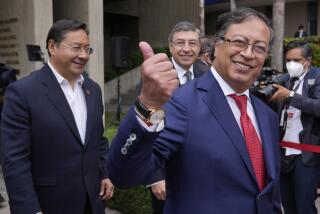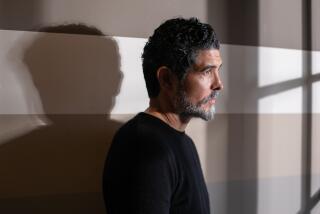Student Muckrakers Ready to Bulldoze Corrupt Politicians
BELGRADE, Yugoslavia — The television commercial shows a black-jacketed hoodlum making deals in a rundown warehouse with a politician wearing a suit and tie. Suddenly, they are surprised by an approaching bulldozer.
The camera zooms in on a stubble-bearded man somberly staring at the corrupt pair from the driver’s seat, and a message from the student-led resistance movement Otpor flashes on the screen: “Just Watching You.”
The advertisement has been airing as a warning to remnants of the old regime and to the new Yugoslav authorities that Otpor, which played a key role last month in toppling Yugoslav President Slobodan Milosevic, is not letting down its guard.
The bulldozer has become a symbol here of people’s power, a reminder of how such a machine was used Oct. 5 to break down the front door of the state television offices and enable protesters to take over that bastion of power. The middle-aged driver, Ljubivoje Djokic, better known as “Joe,” plays himself in the commercial.
Otpor, which uses a raised fist in its logo, wants to keep the pressure on corrupt holdovers from the past, discourage newly empowered politicians from making unseemly compromises with pro-Milosevic forces and warn the erstwhile opposition leaders now in power not to be corrupted by their new status.
The student group is trying to document cases of corruption and abuse of power that occurred during the Milosevic years, change the way Yugoslavs and their politicians view the work of government, and promote honest elections ahead of Dec. 23 voting for a new parliament in Serbia, the dominant republic of Yugoslavia.
“I’m not saying the new government is bad. But we don’t know that it’s good,” said Dejan Randjic, a 27-year-old university student and key figure in organizing Otpor’s media campaign. “We want to put pressure on the [pro-Milosevic] Socialists on one side: ‘You will go to jail--why not?--for some bad things.’ ”
To former opposition figures now in power, he said, Otpor’s message is: “You have to be different, or you will not be in the government anymore.”
The people of Yugoslavia “really should get it into their heads that once you give someone power, they have a tendency to misuse it,” explained Miljana Jovanovic, a 26-year-old student and another key leader of Otpor. “Professional politicians shouldn’t feel they are like God. There is a very big force liberated now: ordinary people.”
An Implicit Threat
Otpor has plastered Belgrade, the Yugoslav and Serbian capital, with billboards and posters showing the “Just Watching You” slogan and images of the bulldozer, with its implicit threat of street demonstrations.
The posters declare: “In our Serbia there are 5,675 registered bulldozers and a couple million potential drivers. Watch what you’re doing!” Below that, playing on the meaning of Otpor as resistance, is the slogan, “The People Are the Resistance.”
“Our aim was that everyone [in government] can recognize themselves as the target of the bulldozer,” Randjic said.
Started two years ago by young people frustrated with the inability of traditional opposition parties to unite and oust Milosevic, Otpor claims about 50,000 activists and broad support among the Serbian people.
For some Otpor members, Milosevic is an example of what people need to worry about. When he came to power, a large majority of Serbs “thought he was a saint, and it turned out he was the devil himself,” said Vesna Petkovic, 24, a student. “So you always have to be careful about power politics.
“Most of the [opposition] parties had some problems in the past involving corruption,” she added.
Otpor has launched a team of 30 volunteer lawyers to investigate corruption. It has dubbed the effort “Service for the Extortion of Truth,” a play on the idea that gangsters and corrupt politicians may demand money but these attorneys are simply demanding the truth.
For two hours every evening, the lawyers gather material from citizens who report evidence of corruption to Otpor’s headquarters.
“We’re investigating all sorts of frauds and abuse, helping out our legal system in dealing with this situation,” said Dragan Palibrk, a 30-year-old attorney with the project. “We as a team of lawyers decided to do it because for 10 years it was virtually impossible to come by that data. We think now is a good time; the conditions exist for us to do this.”
The service takes as a model the Chicago law officers who went after gangster Al Capone. “We want to create some kind of ‘Untouchables,’ ” Randjic said.
Nenad Konstantinovic, 27, one of the founders of Otpor and a lawyer involved in the corruption investigations, said the long-term goal is “to establish a system of responsibility in this society.”
“We are trying to find who are the individuals who did crimes in the past 10 years, corruption especially, and abuse of power,” he said. “From that we will file criminal complaints, and after that, the public prosecutor will start the process. After that, we will try to be the monitor of those services and press them to do their job.”
The project has collected important evidence on corruption at several major state-owned companies, said Otpor leader Jovanovic.
Jovanovic stressed that corruption was not limited to pro-Milosevic authorities. Many city governments controlled by the opposition during the past few years also were involved in corruption, she said.
New Belgrade Mayor Milan Protic, viewed by many Otpor activists as among the cleanest of the former opposition politicians, said that since taking over City Hall from another faction opposed to Milosevic, “we have found that over 750 apartments were given away to people” who were friends or relatives of city officials. The city also owns about 25 luxury cars, he said.
“I believe those young people have the right to send a warning,” Protic said about Otpor.
Some Not Thrilled
Zoran Djindjic, president of the Democratic Party and another key figure in the new power structure, was less enthusiastic when asked about Otpor’s new campaign.
“Nobody is in a privileged position to observe the other one,” said Djindjic, a longtime pro-democracy leader who is viewed as suspect by some partly because of his preference for high-quality suits.
Konstantinovic, the lawyer, said it is important for the new democratic authorities to face criticism from other democratic groups such as Otpor, not just from the Socialist remnants of the old regime.
Otherwise, he said, if the new government falters, voters could turn to the Socialists again as they did in the 1990s with ex-Communists in many former Soviet Bloc countries after center-right governments imposed painful economic reforms. This way, angry citizens can turn to another democratic force, he noted.
Ironically, Otpor has been accused of corruption by some--mainly supporters of Milosevic before the Sept. 24 election that led to his ouster by new President Vojislav Kostunica. These critics put up posters showing the Otpor fist, but full of dollars, with the slogan: “It’s Finished--With Treason.” One of Otpor’s key election slogans had been “He’s Finished.”
Otpor does not deny receiving foreign financial support but argues that taking the aid was a patriotic rather than anti-Serbian act.
“I never felt like a traitor or a foreign mercenary because whatever amount we got from outside or foreigners, we always used it the way we thought we should,” Jovanovic said. “We always kept the Serbian national interest in mind.”
Such outside support helped Otpor surreptitiously print about 60 tons of posters and leaflets in the months before the election, Jovanovic said.
In the run-up to the September vote, Otpor also ran humorous and effective political ads on municipal television stations controlled by the opposition. One showed a housewife holding a T-shirt with an image of Milosevic on it and declaring: “For the last 10 years, I’ve been trying to get rid of this stain. I’ve tried everything.” But now there is a way, she says, gesturing to a washing machine that stood for the election. She pops in the T-shirt and, sure enough, Milosevic is washed away.
The more recent bulldozer ad will be followed by another ad in December targeted mainly at the Serbian Electoral Commission. After the September balloting, the panel’s federal counterpart initially denied that Kostunica had won an outright victory and ordered a new election, which could have prolonged Milosevic’s rule.
“In the next clip,” Randjic said, “this bulldozer driver ‘Joe’ will be checking up the machine, being sure there’s enough oil and gas--just in case.”
More to Read
Sign up for Essential California
The most important California stories and recommendations in your inbox every morning.
You may occasionally receive promotional content from the Los Angeles Times.










